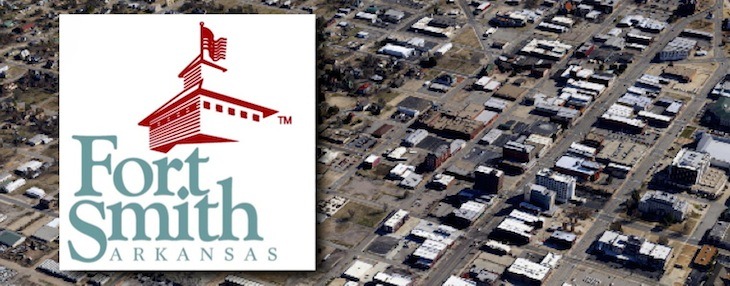Fort Smith Board approves bonds and ‘Tax Back’ request, repeals ‘dance hall’ ordinance
by July 11, 2018 11:04 am 558 views

The Fort Smith Board of Directors on Tuesday (July 10) approved the issuance of up to $160 million in water and sewer refunding and construction revenue bonds expected to save the city approximately $9 million.
The Board also approved a business’s $2 million investment for the state’s Tax Back Program and formally repealed a “dance hall” ordinance prohibiting public dancing on Sundays.
The Board’s first action Tuesday addressed the bond issuance. The offering of the bonds was approved by a resolution at the Board’s April 17 meeting. A memo from Jeff Dingman, the city’s deputy city administrator, stated most of the savings would come from a $67 million refunding of the Series 2008 bonds. Another $82 million of the $160 million total will finance new water and sewer projects identified in the utilities department’s capital improvement plan, including water transmission projects and capacity and repair work required for compliance with the estimated $480 million federal consent decree.
The remaining $11 million will go toward “premiums, reserves, or in case estimates change slightly due to changes in bond pricing as we near the date of issuance,” Dingman said, adding the amount “also ensures that we do not need to start the process over should there be changes, such as if the purchase of insurance is required.”
A bond ordinance will come before the Board for approval at its July 24 regular meeting. The bonds will be priced and offered for sale after a 30-day waiting period has expired and the ordinance has gone into effect. A supplemental ordinance will then be prepared for the Board’s approval with final pricing terms and numbers.
Bank of America Merrill Lynch will be the city’s lead underwriter on the project. The company requested this process change from the former practice of selling bonds on the day of the ordinance’s approval but holding the proceeds until a 30-day period had passed.
TAX BACK, FOOTLOOSE
Also Tuesday, the Board unanimously approved endorsement of Midwest Automation Custom Fabrication Inc. for the state’s Tax Back Program. The company will invest $2.243 million in its facility, including $1.5 million to purchase, renovate, and expand the existing property and buildings at 2100 Wheeler Ave. and $743,000 for industrial equipment.
The combined company employs about 100 and is expected to grow to 120 jobs with an annual payroll of almost $5 million and average wages of around $20 per hour. Arkoma, Okla.-based Midwest Automation and Fort Smith-based Custom Fabrication and Engineering announced the merger on June 20.
Midwest Automation Custom Fabrication, Inc., is a fully integrated fabrication company that designs, engineers and installs structural steel for commercial and industrial companies in North America. They trace their roots in Arkansas to the founding of Custom Fabrication and Engineering in 1985.
The Tax Back Program is a state and local sales tax refund incentive to attract business growth or expansion to Arkansas. The incentive applies to capital purchases associated with construction of new facilities or expansion of existing facilities (such as equipment or building materials) and does not apply to ongoing purchases. The majority of the incentive will be derived from the state sales tax rate. However, in order to participate in the program, local governments must also agree to the sales tax refund.
Lastly — and in what was the quickest decision of the night — the Board voted unanimously to repeal the “dance hall” ordinance enacted as Ordinance No. 2107 on Nov. 27, 1953, which made it “unlawful for any person, firm or corporation to operate a public dance hall on Sunday, or to operate any other place in which dancing is engaged on Sunday.”
On June 28, Ward 2 Director André Good called for the item to be added to the Board’s July 10 agenda. While acknowledging the silliness behind the ordinance, Good told Talk Business & Politics if the city wants to attract tourism, new businesses, and new money, “then we have to be a vibrant, welcoming, diverse, inclusive and modern city,” adding that “a ban on dance halls and dancing on Sunday and other such antiquated policies sends a message — and not a good one. It says: ‘Entering Fort Smith; traveling back in time.'”
